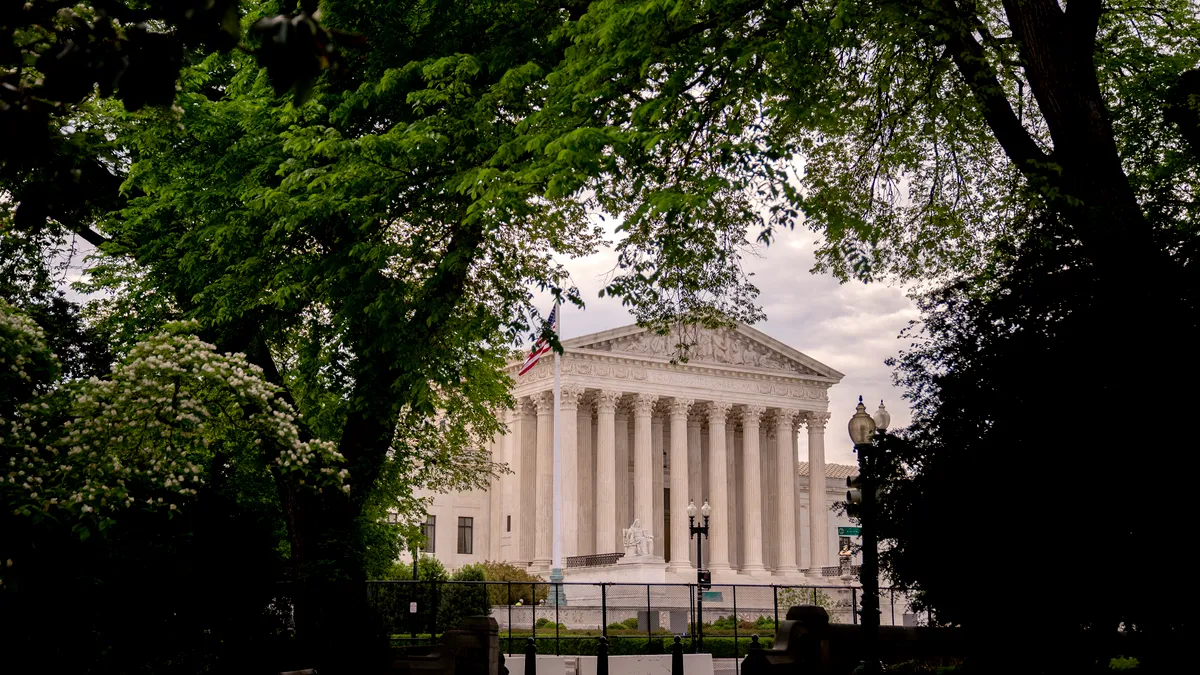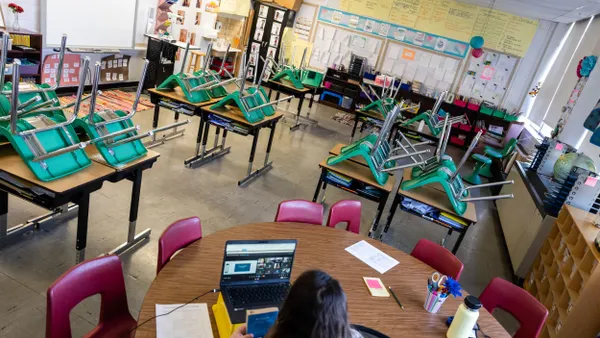Dive Brief:
- A Pennsylvania high school violated a student's First Amendment rights when it disciplined her for saying in a Snapchat post to a select group of peers, "F--- school, f--- softball, f--- cheer, f--- everything," after her rejection from the school's varsity cheerleading team, according to the U.S. Supreme Court's 8-1 Wednesday decision protecting student speech in Mahanoy Area School District v. B.L.
- However, in the opinion delivered by Justice Stephen Breyer, justices differed with the Third Circuit when they decided there may be instances in which schools might have to regulate off-campus speech, such as bullying, threats or failure to follow rules during virtual learning. Still, they warned schools must be careful when disciplining off-campus speech because, when coupled with on-campus speech regulations, "doing so may mean the student cannot engage in that kind of speech at all."
- While the decision had the potential to determine whether and when schools could discipline off-campus speech, justices kept their ruling narrow. However, they did make clear that through this case, the first of its kind in over five decades, "the leeway the First Amendment grants to schools in light of their special characteristics is diminished."
Dive Insight:
The case builds on the 1969 Supreme Court decision Tinker v. Des Moines Independent Community School District, which determined public schools can discipline or regulate speech that would disrupt school operations.
When oral arguments were heard in April, the petitioners in the case, the Mahanoy Area School District, agreed schools should teach "how to think, not what to think" and cannot punish students for being critical of or ridiculing school. However, they argued schools should be able to regulate off-campus student speech that impacts school climate, disrupts school activities or interferes with other students' rights, arguing the student's video on social media, which was made on a Saturday when school was out of session, targeted coaches and students and their ability to cheer.
Attorneys representing the disgruntled student and her parents argued the social media post didn't disrupt school operations, and that a one-time incident was separate from other instances of ongoing online campaigns or virtual harassment disparaging schools. The social media rant resulted in the student's suspension from the cheerleading squad for a year.
Justices at the time seemed skeptical of the petitioners' argument, with both right- and left-leaning justices questioning whether the decision to suspend the student from the cheerleading squad for a year was a justified response after the student "blew off steam like millions of other kids have when they're disappointed from being cut from the high school team, or not being in the starting lineup, or not making all-league."
Now, the decision emphasizes the importance of protecting student speech even when schools may disagree with its content.
"America’s public schools are the nurseries of democracy. Our representative democracy only works if we protect the 'marketplace of ideas,'" Breyer wrote. "Thus, schools have a strong interest in ensuring that future generations understand the workings in practice of the well-known aphorism, 'I disapprove of what you say, but I will defend to the death your right to say it.'"
National Association of Secondary School Principals CEO Ronn Nozoe and education lawyers who spoke with K-12 Dive in April said schools need to be able to discipline in scenarios where off-campus speech spills over to the on-campus climate or threatens school safety.
However, justices also rejected the idea during oral arguments that the content of the student's message in the Mahanoy Area School District case was threatening or caused substantial disruption.
Now, their ruling suggests schools "need to go through a serious set of analytical hurdles to overcome the basic principle of highly protected off-campus speech," according to David Bloomfield, an education lawyer who filed a friend-of-the-court brief in support of the student along with teachers, school administrators and the National Council of Teachers of English. "Schools can’t police remarks such as B.L.'s despite its vulgarity and criticism of school practices," he added.
Prior to this case, courts would require proof of a school connection, or "nexus," and proof of substantial disruption for off-campus discipline to fall within the law, according to Jackie Gharapour Wernz, a lawyer with Franczek P.C. in Chicago who represents districts in civil rights cases and worked for OCR under the Obama and Trump administrations. The new decision doesn't seem to substantially alter that requirement and instead adds three features administrators must take into consideration when disciplining off-campus speech, including on social media.
According to the opinion, schools must consider:
- Off-campus speech will normally fall under parental responsibility rather than on administrators to discipline.
- Off-campus speech regulations, combined with on-campus rules, are 24/7, so courts must be more skeptical of a school’s efforts to regulate off-campus speech.
- Schools should protect a student’s unpopular expression, especially when the expression takes place off-campus, because it advances democracy.
The practical application of these three features, Wernz said, remains a "gray area" until lower courts step in to interpret them into actionable guidance. At the very least, the case allows schools in some instances to discipline off-campus speech, including on social media, but puts up guardrails against when schools can take action.
"There's very good reason for both sides to be happy, but now we have the challenging task of actually taking this and turning it into something that is practical [for adminisrators]," Wernz said, "and the court did not make that easy for us."
While the justices did not make a sweeping decision on when schools may discipline off-campus speech, it did say future cases may do so. "This case can, however, provide one example," the court's opinion concluded.







 Dive Awards
Dive Awards





